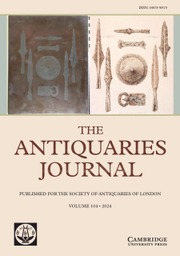Article contents
THE CHRONOLOGICAL FRAMEWORK OF EARLY ANGLO-SAXON GRAVES AND GRAVE GOODS: NEW RADIOCARBON DATA FROM RAF LAKENHEATH, ERISWELL, SUFFOLK, AND A NEW CALIBRATION CURVE (IntCal20)
Published online by Cambridge University Press: 26 February 2021
Abstract
Between 1998 and 2008, 450 inhumation burials of the fifth to eighth centuries ad were excavated in four separate but adjacent burial grounds within RAF Lakenheath airbase in Suffolk. Study of the evidence has been based on the typology of the national chronological framework of sixth- and seventh-century graves and grave goods published in 2013, and correlated also with a related East Anglian regional scheme. Fifty high-precision radiocarbon dates allow for thorough evaluation of the scope for applying the phase-structure and estimated date-boundaries of the national framework to this one large site. The results can be held to reproduce the core sequence of the national framework, albeit with necessary modifications that provide greater insights into the processes used to generate models of the data, besides significant modifications to the perceived date-ranges of certain artefact-types. The results have also been markedly influenced (and apparently improved) by a new standard calibration curve, IntCal20, launched in August 2020. This study thus suggests key agenda for further productive research into this contextually vital body of information.
- Type
- Research paper
- Information
- Copyright
- © The Author(s), 2021. Published by Cambridge University Press on behalf of The Society of Antiquaries of London
References
BIBLIOGRAPHY
- 3
- Cited by


